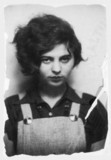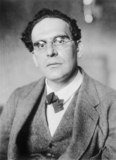Kurt Jooss
Around the world with the Folkwang dance companyBorn on 12 January 1901Died on 22 May 1979Dancer, ChoreografParallel to studying music in Stuttgart, Kurt Jooss discovered his enthusiasm for the art of dance through his acquaintance with the Hungarian choreographer Rudolf von Laban. In 1927 he founded the Folkwang experimental dance theatre studio in Essen. He became internationally known for the expressionist choreography of the piece Der grüne Tisch (The Green Table) (1932).
Georg Kaiser
Born on 25 November 1878Died on 4 June 1945WriterGeorg Kaiser went into exile comparatively late, especially considering his rejection of Nazism had been discovered some years previously and he had been excluded from the Prussian Academy of Arts as early as May 1933.
Mascha Kaléko
Poet of the New ObjectivityBorn born on 7 June 1907Died died on 21 January 1975WriterThe work of poet Mascha Kaléko was marked by the experience of homelessness and rootlessness. Born the child of a Russian Jewish businessman in Western Galicia (now Poland), she moved to Germany with her family after the outbreak of the First World War to escape anti-Semitic pogroms and military entanglements.
Ossip Kalenter
Born on 15 November 1900Died on 14 January 1976WriterDresden-born writer Ossip Kalenter, whose real name –according to his German passport of 1939 – was actually Johannes Burckhardt, first came to public attention in 1920 with his poetry anthology Der seriöse Spaziergang (“The Sedate Stroll”). However, after moving to Italy in 1924, he mainly made a name for himself as a newspaper author and features writer for publications such as the Frankfurter Zeitung, Weltbühne, the Berliner Tagblatt and the Neue Zürcher Zeitung.
Gina Kaus
Born on 21 October 1893Died on 23 December 1985WriterIn addition to dramas, poetry and short stories, Gina Kaus also wrote for various newspapers, magazines and literary journals in the 1920s. In Vienna and Berlin, she was well-established in the respective city’s artist networks.
Alfred Kerr
Born on 25 December 1867Died on 12 October 1948Writer, Critic, DramatistThe Berlin theatre critic and writer Alfred Kerr had publicly warned of the threat of national socialism in the years before 1933. For this reason in February 1933 he already lived in fear for his life and had to flee Germany.
Hermann Kesten
Born on 28 January 1900Died on 3 May 1996Writer, PublicistWhen Hermann Kesten left Berlin hastily in March 1933 and went into exile in France, he had already published four novels, a book of short stories and seven plays. He belonged to a generation of younger writers who had a significant influence on the literature of the Weimar Republic from the late 1920s.
Irmgard Keun
Born on 6 Februar 1905Died on 5 Mai 1982WriterIrmgard Keun enjoyed great public acclaim for her first two novels Gilgi, eine von uns [Gilgi, One of Us] (1931) and Das kunstseidene Mädchen [The Artificial Silk Girl] (1932) during the last few years of the Weimar Republic. In 1933, the Nazis banned both works, condemning them as “asphalt literature with anti-German tendencies”.
Paul Klee
Born on 18 December 1879Died on 12 January 1940PainterAfter being dismissed from the Art Academy in Düsseldorf in autumn 1933, the painter Paul Klee lived in Berne for six years. The son of a German father and Swiss mother, Klee was born in Switzerland yet had obtained the citizenship of his father.
Otto Klemperer
Born on 14 May 1885Died on 6 July 1973Conductor, ComposerIn the Weimar Republic, Otto Klemperer was regarded as a conductor of the modern age: Among others, he championed works by Arnold Schönberg and Kurt Weill. The numerous pieces he composed himself are largely unknown.











